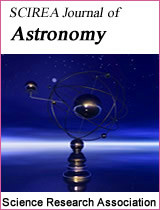Could the number of blue straggler stars help to determine the age of their parent globular cluster?
DOI: 10.54647/astronomy160048 99 Downloads 102873 Views
Author(s)
Abstract
A recent study shows, from an empirical deduction, that the number and the presence of the blue straggler stars (BSS) in an open cluster follow a function whose components are the ratio between age and the relaxation time, ƒ, and a factor, ϖ, which is an indicator of stellar collisions plus primordial binaries. The relation among the number of blue straggler stars, the factor ƒ and the factor ϖ of each globular cluster allows for deriving the age of the respective globular clusters. This method has been applied individually over 56 globular clusters containing BSS. The values derived for the cluster ages from our methodology do not differ from those derived from other methods. A special case is the cluster NGC104 whose age exceeds 13.8 Gyr (its age is in between 19.04 and 20.30Gyr), which would have a very exotic explanation: the existence of an intermediate black hole in the center of the cluster. That black hole main-sequence star (BH-MS) binaries with an initial orbital period less than the bifurcation period can evolve into ultra-compact X-ray binaries (UCXBs) that can be detected by LISA. On the other hand, if that age were true, it would call into question the expansion velcity for a flat Universe. This would call into question the case for a dark energy–dominated Universe.
Keywords
galaxy: globular clusters: general –stars: blue stragglers
Cite this paper
Félix Llorente de Andrés,
Could the number of blue straggler stars help to determine the age of their parent globular cluster?
, SCIREA Journal of Astronomy.
Volume 5, Issue 2, April 2023 | PP. 29-41.
10.54647/astronomy160048
References
| [ 1 ] | Ahumada, J. A. & Lapasset, E. 2007, A&A, 463, 789 |
| [ 2 ] | Boberg, O.M., Friel, E.D. and Vesperini, E., 2016, ApJ 824, 5 |
| [ 3 ] | Bono, G.; Stetson, P. B.; VandenBerg, D. A, et al., 2010, 708, L4 |
| [ 4 ] | Cayrel, R., Hill, V., Beers, T.C., Barbuy, et al., 2001 Nature 409, 691 |
| [ 5 ] | Correnti, M., Gennaro, M., Kalirai, J. S.; Brown, T. M.; |
| [ 6 ] | Calamida, A, 2016, ApJ, 823, 18 |
| [ 7 ] | Cowan, J. J., Sneden, C., Burles, S., et al., 2002, ApJ, 572, 861 |
| [ 8 ] | de Marchi, F., de Angeli, F. , Piotto, G., Carraro, G., Davies, M.B., 2006, A&A, 459, 489 |
| [ 9 ] | Florentino, F., Massaria, D., McConnachiec, A., et al, 2016, aeXiv :1608.01457v1 |
| [ 10 ] | Gratton, R. G., Bragaglia, A.,. Carretta, E, et al, 2003,A&A 408, 529 Harris, W.E. 1996, AJ, 112, 1487 (Edition 2010) |
| [ 11 ] | Hense et al.2004, ApJS, 155, 551 |
| [ 12 ] | Kacharov, N., Bianchini, P., Koch, A. et al. 2014,arXiv:1406.1552v1 |
| [ 13 ] | Ke Qin, Long Jiang, Wen-Cong Chen, 2023, ApJ, 944, 83 |
| [ 14 ] | Kiziltan, B., Baumgardt, H. and Loab, A., 2017, 543, 203 |
| [ 15 ] | Krauss, LM & Chaboyer, B.,2003, 'Age estimates of globular clusters in the Milky Way: Constraints on cosmology' Science, vol 299, no. 5603, pp. 65-69. |
| [ 16 ] | Krause, M.G.H.; Charbonel, C.; Bastian, N.; Diel R., 2016,A&A, 587, 53 |
| [ 17 ] | Kuzma, P.B., Da Costa, G.S., Mackey, A. D. and Roderick, T. A 2016 arXiv:1606.05949v1 |
| [ 18 ] | Leigh, N., Sills, A. and Knigge, C. 2007, ApJ, 661, 210 |
| [ 19 ] | Llorente de Andrés, F. and Morales- Durán, C, 2022, AmJAA |
| [ 20 ] | American Journal of Astronomy and Astrophysiscs, 2022, 9, 56. |
| [ 21 ] | Massari, D.; Fiorentino, G.; McConnachie, A. et al 2016, A&A 586, A51 |
| [ 22 ] | Meissner, F. and Weiss, A., 2006, A&A, 456, 1085 |
| [ 23 ] | Moretti, A., De Angeli, F. and Piotto, G., 2008, 183 |
| [ 24 ] | Muñoz, Geisler, D. and Villanova, S.,2013, arXiv:1305.3645v1 |
| [ 25 ] | Rajendra Gupta. 2023,MNRAS 524, 3385–3395. |
| [ 26 ] | Recio-Blanco, A., Aparicio, A., Piotto, G., De Angeli, F. and Djorgovski, S. G. 2006, A&A, 452, 875 |
| [ 27 ] | Van den Berg, D.A., Brogaard, K., Leaman, R. and Casagrande , L. 2013, ApJ, 775, 13 |

